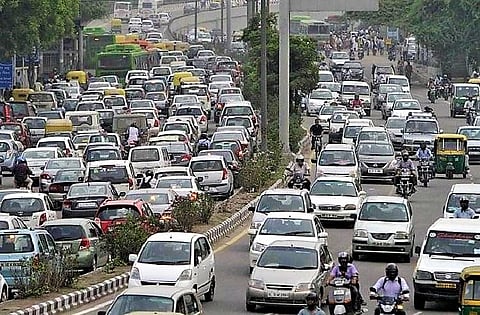

By Yeshwanth Reddy and Jagriti Arora, Ola Mobility Institute
As the roads on google maps turn from green to red during peak hours, netizens are increasingly talking about their struggles in everyday traffic on social media without realizing that they are part of the traffic. Like every drop of water in the ocean, every car on the road counts. An aspirational and growing middle-class has led to a massive addition of cars to Indian roads from 6.1 million in 2000 to 30.2 million in 2016, according to data from Ministry of Road Transport and Highways (MoRTH). Not only does it point towards insufficient public transport infrastructure, but also towards the need for comfort and flexibility along with a sense of accomplishment that comes with owning a car.
Shared mobility offers the ideal solution to congestion in cities by improving existing asset utilization. MIT Center for Science conducted a case study in New York wherein it was predicted that 98% of the demand for single vacancy vehicle (14,000 cars in NY) can be met by 3000 four-passenger cars. Closer home, a study by the University of Chicago on odd-even scheme in Delhi reported a 10-13% reduction in particulate matter and a 5.4% increase in average speeds. Clearly, the city benefited from reducing the private cars on the road, albeit temporarily. Cities need to work on long-term solutions to reduce dependence on private vehicles for mobility. Carpooling offers a long-term solution by reducing the number of private cars on the road as well as improving their utilization.
App-based mobility solutions are heralding a paradigm shift from ‘owning the drive’ to ‘owning a ride’. Today various carpooling applications operate in India, for example carpooling app Quick Ride reports that around 37000+ employees of Wipro uses its app for daily commute and so far have shared more than five lakh rides. Conversations with office goers in various metropolitan cities revealed that many prefer to carpool with their colleagues or friends to avoid the hassles of driving every day. By pooling, their effort in driving through the congested roads is reduced by at least 50%.
However, the biggest challenge they face in pooling is finding co-poolers who live in their vicinity, have similar work hours and offices being located in the same areas. Growth of high-rise societies, gated communities, and large office complexes provides a natural pooling of office going citizens across various gated communities as carpooling demand centers.
Concerns of policymakers around carpooling
For cities to fully benefit from carpooling, it needs to be adopted at larger scale for which an enabling regulatory environment is required. Recent reports that the Ministry of Road Transport and Highways is contemplating a framework to allow carpooling operations is a welcome step in this direction. The report further elaborates that the Ministry is considering limiting these trips to 3-4 trips per day, providing insurance for occupants, maintaining KYC of passengers and linking the vehicles to the governments vehicle database ‘VAHAN’ to ensure enforcement.
Policymakers are wary of carpooling operations turning into a full-time taxi service without complying with stringent KYC and permit requirement norms for commercial operations of taxis. Other concerns include safety of passengers due to lack of background checks on white-plate cars, the applicability of insurance to passengers in case of any incident, ensuring the safety of women passengers, and pricing of such a service. Singapore, Canada, Sweden, France, Netherlands have legalised carpooling operations and defined the framework for carpooling to limit the number of trips, pricing, method of hailing, mode of payment, seating capacity etc.
Possible solutions
Digital aggregator platforms can effectively address all these concerns by defining the number of trips, origin-destination, pricing, length of trips and timing of the trips making enforcement hassle free. A flexible framework is also needed to enable the vehicle owners and trip seekers to freely select and shift between the aggregator platform of their choice to prevent market monopoly. This could be achieved through integration with VAHAN database.
The concern on the insurance of co-passengers can be addressed through mandating micro-insurance for each trip undertaken on the platforms, which is already being provided by a few service providers. Safety can further be enhanced by linking KYC to professional job profiles and passenger ratings on platforms.
To realize the true potential of pooling, various levers such as high parking prices in office complexes, restricting operations of white plate cars with single occupancy during peak hours on certain routes, encouraging corporates to provide monetary incentives to employees using carpooling need to be explored to achieve the desired objectives.
The natural pooling of trip demand and supply in gated communities and societies could be an ideal starting point for cities like Gurgaon, Bengaluru, Mumbai, Chennai, Hyderabad, Kolkata and Pune to promote carpooling. An enabling framework would readily add millions of users from existing app-based services as potential carpooling customers.
Large scale adoption of carpooling has the potential to reduce congestion, improve travel speeds and reduce the demand for huge parking spaces in city centers. Besides, the valuable parking real estate can instead be used to provide better utilities such as parks and community centers to improve the quality of life for citizens.
Views expressed are authors' own
Jagriti Arora is a Research Associate with Urban Mobility track at Ola Mobility Institute, who dabbles into various facets and factors that drive urban systems. She earned a Masters’ degree in Urban Planning from IIT Roorkee. Yeshwanth Reddy, a graduate from Indian School of Business is a Public Policy expert in transportation and currently leads research and outreach for Urban Mobility at Ola Mobility Institute.